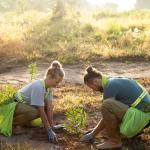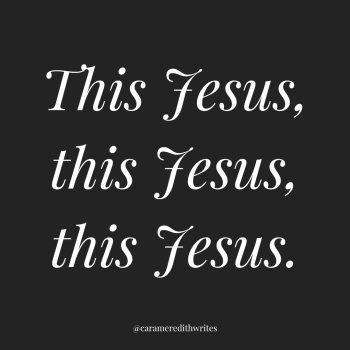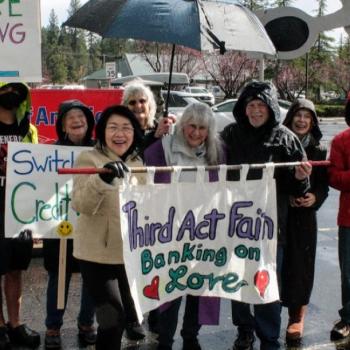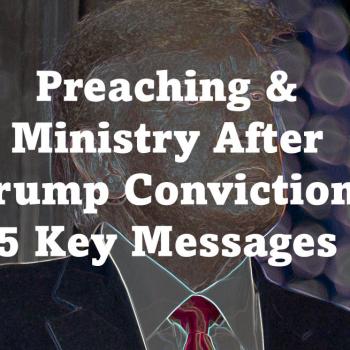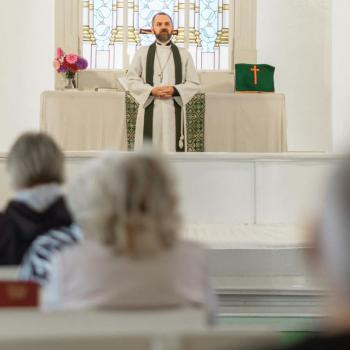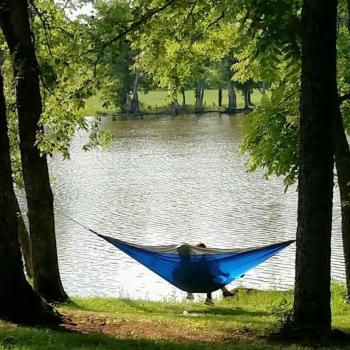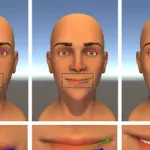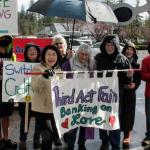Earth Day is right around the corner! Science and religion can collaborate to help with preaching about climate change.
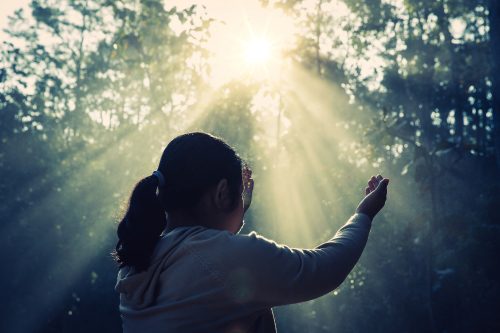
Religion and Science Can Be Besties
In 2017, I wrote a blog piece called Religion And Science Can Be Besties! It’s Time For New Friendships as the March for Science was happening. The movement protested Trump administration policies that cut funding for scientific research and restricted the availability of data to the public. The march also called out the administration’s decimation of environmental protections and initiatives to mitigate climate change.
In the piece, I argued that religious folks can draw on science to help better understand the complex and mysterious world around us.
At the same time, scientists can turn to religious communities to help them think through the moral and ethical ramifications of their discoveries, technological innovations, medical treatments, and research methods. And when it comes to climate and environmental issues, houses of worship can be catalysts for action through their moral and ethical frameworks that mobilize believers to work for positive change.
Seven years later, with our climate crisis worsening, it’s more important than ever for people of good will in the realms of science and religion to work together to address the dire state of our planet.
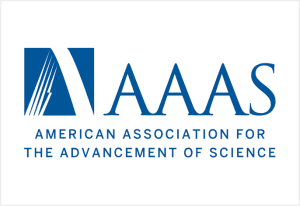
That’s why I was excited to learn about a program called Dialogue on Science, Ethics, and Religion (DoSER) through the American Association for the Advancement of Science (AAAS). The program facilitates communication between scientific and religious communities and builds on AAAS’s commitment to relate scientific knowledge and technological development to the concerns of society at large.
Climate Science in Theological Education grant
To encourage seminaries and divinity schools engaging with this kind of work, they established the Climate Science in Theological Education grant. This project specifically connects climate scientists with those in the context of theological education, leadership, and ministry. Their goal is to enable schools to build capacity to start (or continue) having conversations at the intersection of climate science and theological education.
I eagerly applied for the grant with a project I proposed through Lexington Theological Seminary called “Equipping EcoPreachers for a Climate-Changed World” and was excited when our proposal was accepted!
Earth Day Webinar, April 23, 2024
Our first activity will be a webinar on Tues., April 23, 6:00 Eastern, “Climate Science, the Bible, and Theology: Possibilities for Preaching and Ministry.” This online event will allow us to bring together students, alumni, ministers, and other church leaders to explore what it means to be the church in a climate-changed world, and to embrace an approach to sermons that nurtures spiritual and ecological imagination.
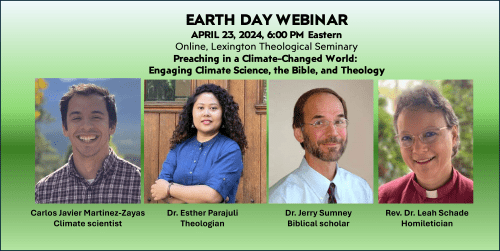
The climate scientist
We have climate scientist Carlos Javier Martinez-Zayas who will share the latest in climate research and what this will mean for congregations who often minister to those affected by climate-related disasters.
The theologian
Then, our professor of Christian Theology, Dr. Esther Parajuli, will help us think about the relationship between God and suffering in a climate-changed world as well as the role of the church and how preachers can address these themes in their sermons.
The biblical scholar
Finally, Dr. Jerry Sumney, our professor of biblical studies, will help us look at upcoming lectionary texts in dialogue with climate science and ecotheology in order to suggest entry points and ideas for preaching.
Register for the webinar today!
This webinar co-hosted by our partners, The BTS Center and Creation Justice Ministries. And it’s free thanks to a grant from the American Association for the Advancement of Science program on Climate Science in Theological Education. To register, click here.
If you’re a preacher, seminarian, Bible study leader or anyone who would like some guidance for thinking about Scripture, theology, and climate issues – this Earth Day webinar on April 23rd is for you.
I’m grateful that the hope I had back in 2017 for collaboration between science and faith now has support within my seminary and AAAS. Besties, indeed!
Read also:
Plastic Jesus, Earth Day: Calling for a Plastic-Free Future
Beyond Earth Day: 10 Ideas for Environmental Advocacy and Activism in Your Church
Six Children’s Sermon Ideas for Earth Day
Looking for ongoing support, resources, and colleagues as you preach about environmental issues?
The new EcoPreacher Cohort begins in September 2024! This is a monthly online gathering of preachers for learning and companionship to preach effectively in a climate-changed world. A joint project of The BTS Center, Creation Justice Ministries, and Lexington Theological Seminary. To learn more click here.

The AAAS is the world’s largest general scientific society and publisher of the Science family of journals. The nonprofit is open to all and fulfills its mission to “advance science and serve society” through initiatives in science policy, international programs, science education, public engagement, and more. Building upon its mission, AAAS established the Dialogue on Science, Ethics, and Religion (DoSER) program in 1995 to facilitate communication between scientific and religious communities. For the latest information and news about AAAS DoSER and the Climate Science in Theological Education project, visit AAAS.org/DoSER, ScienceReligionDialogue.org, and ScienceforSeminaries.org.
The Rev. Dr. Leah D. Schade is the Associate Professor of Preaching and Worship at Lexington Theological Seminary in Kentucky and ordained in the ELCA. Dr. Schade does not speak for LTS or the ELCA; her opinions are her own. She is the author of Preaching in the Purple Zone: Ministry in the Red-Blue Divide (Rowman & Littlefield, 2019) and Creation-Crisis Preaching: Ecology, Theology, and the Pulpit (Chalice Press, 2015). She is the co-editor of Rooted and Rising: Voices of Courage in a Time of Climate Crisis (Rowman & Littlefield, 2019). Her newest book is Introduction to Preaching: Scripture, Theology, and Sermon Preparation, co-authored with Jerry L. Sumney and Emily Askew (Rowman & Littlefield, 2023).



